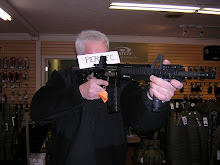I noticed something a couple weeks ago, and it was verified at the last match I shot. I started working on it, and have a long way to go, but I think I'm on to something.
I shoot with a timer to give a stimulus that causes me to draw and shoot. I don't have to use it for that, but since I'm gonna be shooting anyway, I might as well get some time data while I'm at it, right? I like having to respond to something rather than choosing the time of shooting; my suspicion is that this is as close as I'm going to be able to get to what might happen in real life when I'm shooting by myself.
One of the first things to notice is that a timer's beep spans a certain amount of time. I suspect mine's about one second long, but I haven't actually looked into it. So, it's got a start, when the buzzer first sounds, and it's got an end, when the buzzer is finished buzzering, right? What I noticed most shooters doing was starting to move at the end of the buzz/beep/zappy sound/whatever, with only the best of them-the master class and the one or two grand masters we see a few times a year-starting their draw as soon as the buzzer starts to sound. Once I started working on that, I noticed that my best runs (and to be clear, there were only a few of them) trimmed a full half second off my times.
At the match a week ago, the number of people who commented "You were shooting a lot better today" or words to that effect was surprising to me. From my perspective I shot about the same as I typically do, with perhaps a little more accuracy than I have previously. But the only reason I didn't win the match is the same reason I usually don't win the match: I'm too slow in running, and there's nothing I can do about that; I've been slow my entire life. The only thing I was doing differently, though, was that I was trying to concentrate on starting to move at the start of the beep.
Now, I'm a never-was and have never been in a gunfight. However, I have several close friends who have, and I can get their impressions on such topics. Speed is an important component of a fight, even a brawl. The guy who's reacting is behind the curve, right? What can be done about that? Seems to me the only option is to shorten the curve, and that could be all the difference. As they say, "you have the rest of your life to figure it out".
The way I worked on it, and this is "a" way and by no means "the" way, so if you have a suggestion I wanna hear it, was to do some dry runs. First I started imagining the buzzer going off, and starting to get my draw going at the beginning of the sound. I then practiced my draw, again trying to get moving as soon as I heard the buzzer. The way I tested this was trying to note where the gun was when the buzzer ended; when I was working it I had the gun partway into presentation when the buzzer stopped. I tried stopping movement a few times when the buzzer ended to see where I was. That's hard to do, and there's so much lag between hearing, processing, and responding to the stimulus that I didn't really take much note of it, and instead just tried to gauge where I was. I think this is where video would be very handy.
Anyway! after a while, I was noticing that my times were improving, and it wasn't because my movements were faster from the hand to the gun to the draw to the presentation. If anything, I was getting slightly slower because it was very hot and humid at the range. It was because I was initiating the movement to get going faster than I had before, and that was entirely because I wasn't waiting for the buzzer to complete before I started moving. What I'm hoping this will assist in doing is that if I have to use my gun for real, I won't be as far behind the curve. I'm hoping that I'm training my brain to process faster. It's smarter than I am, so I expect it'll make a difference in the long run. I just wish I'd started working on this 25 years ago.
Sunday, August 05, 2012
Subscribe to:
Posts (Atom)



